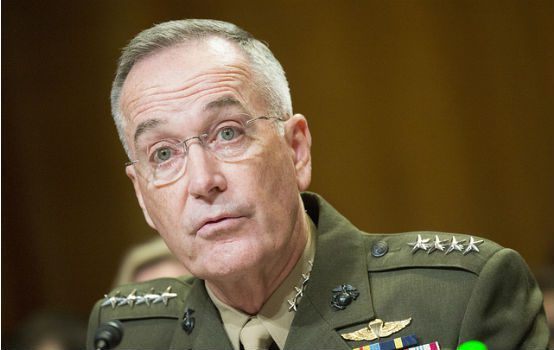When Military Leaders Have Reckless Disregard for the Truth

To borrow from the British definition of an ambassador, United States military leaders are honest soldiers promoted in rank to champion war with reckless disregard for the truth. This practice persists despite the catastrophic waste of lives and money because the untruths are never punished. Congress needs to correct this problem forthwith.
General Joseph F. Dunford, Jr., chairman of the Joint Chiefs of Staff, exemplifies the phenomenon. As reported in The Washington Post, Dunford recently voiced optimism about defeating the Afghan Taliban in the seventeenth year of a trillion-dollar war that has multiplied safe havens for international terrorists, the opposite of the war’s original mission. While not under oath, Dunford insisted, “This is not another year of the same thing we’ve been doing for 17 years. This is a fundamentally different approach…[T]he right people at the right level with the right training [are in place]…”
There, the general recklessly disregarded the truth. He followed the instruction of General William Westmoreland who stated at the National Press Club on November 21, 1967 that the Vietnam War had come to a point “where the end begins to come into view.” The 1968 Tet Offensive was then around the corner, which would provoke Westmoreland to ask for 200,000 more American troops. The Pentagon Papers and Lieutenant General H.R. McMaster’s Dereliction of Duty have meticulously documented the military’s reckless disregard for the truth throughout the Vietnam War.
Any fool can understand that continuing our 17-year-old war in Afghanistan is a fool’s errand. The nation is artificial. Among other things, its disputed border with Pakistan, the Durand Line, was drawn in 1896 between the British Raj and Afghan Amir Abdur Rahmen Khair. Afghanistan’s population splinters along tribal, ethnic, and sectarian lines, including Pushtans, Uzbeks, Hazara, Tajiks, Turkmen, and Balochi. Its government is riddled with nepotism, corruption, ineptitude, and lawlessness. Election fraud and political sclerosis are endemic. Opium production and trafficking replenish the Taliban’s coffers.
The Afghan National Army (ANA) is a paper tiger. Desertion and attrition rates are alarming. Disloyalty is widespread. American weapons are sold to the Taliban or captured. ANA soldiers will not risk that last full measure of devotion for an illegitimate, unrepresentative, decrepit government.
The Taliban also has a safe haven in Pakistan. A staggering portion—maybe up to 90 percent—of United States assistance to Afghanistan is embezzled, diverted, or wasted. John Sopko, the Special Inspector General for Afghanistan Reconstruction (SIGAR), related to Chatham House in London that “SIGAR was finding waste, fraud, and abuse nearly everywhere we looked in Afghanistan—from the $488 million worth of aircraft that couldn’t fly, to the navy the U.S. bought for a landlocked country, to the buildings the U.S. paid for that literally melted in the rain….”
“The Taliban are getting stronger, the government is on the retreat, they are losing ground to the Taliban day by day,” Abdul Jabbar Qahraman, a retired Afghan general who was the Afghan government’s military envoy to Helmand Province until 2016, told the New York Times last summer. ISIS has now joined the Taliban and al-Qaeda in fighting the United States. Secretary of Defense General James Mattis conceded to Congress last June that “we are not winning in Afghanistan right now,” but added polyannaishly, “And we will correct this as soon as possible.” Only two months earlier, the Defense Department insisted that dropping the Mother of All Bombs on Afghanistan would reverse the losing trend.
Upton Sinclair sermonized: “It is difficult to get a man to understand something, when his salary depends on his not understanding it.” Thus do military leaders deceive themselves about futile wars to extract more spending, to maintain their professional reputations and public stature, and to avoid the embarrassment of explaining to Congress and the American people that astronomical sums have been wasted and tens of thousands of American soldiers have died or were crippled in vain.
To deter such self-deception, Congress should enact a statute requiring the retirement without pension of any general or admiral who materially misleads legislators or the public about prospective or ongoing wars with reckless disregard for the truth. That sanction might have prompted General Dunford to acknowledge the grim truth about Afghanistan: that the United States is clueless about how to win that war.
Bruce Fein was associate deputy attorney general under President Reagan and is the founding partner of Fein & DelValle PLLC.
Comments